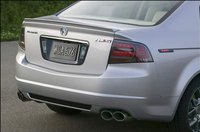VAT and other charges
Asked by LuisDeLeon Sep 04, 2012 at 12:01 PM about the 2009 Acura TL FWD with Technology Package
Question type: Shopping & Pricing
I'm looking for used cars. So, my question is: Are these prices including all VAT and charges applicable in each states? Do I need to pay anything else? How much if I bought in NJ or NY?
2 Answers
LuisDeLeon answered 12 years ago
Thanks Tom. Have you any idea how much could be it? i.e. VAT and others. Thanks for your comments
It's is difficult to provide an exact number, because the vehicle price listed in advertisements, and even the price paid at an automotive dealership are not NOT 'on the road' (OTR) prices. The Manufacturer’s Suggested Retail Price (MSRP) is similar to a ‘starting at’ price, and only includes the price of the actual vehicle. In the US, this advertised MSRP is often only a basic, low-tier model price for the cost of the vehicle ONLY, EXCLUDING better models, add-on equipment, upgrades, taxes, license plate registration fees, insurance fees, vehicle inspection fees, etc. The MSRP can also be effected by manufacturer rebates, discounts, and incentives (all similar to using a coupon to get a particular dollar amount discounted). After you negotiate a selling price for the vehicle, the final out of pocket costs for everything will depend greatly on which state (New Jersey, Florida, etc.) the vehicle offered for sale is located, or where the purchase transaction physically takes place. Nearly all US states assesses a slightly different general sales tax percent rate (similar to EU VAT). The state sales tax is calculated as a percentage of the vehicle's purchase price and any other fees associated with the negotiated purchase price. Sales taxes are also assessed and collected for all services such as repairs, additional equipment, or and even extended warranties; essentially anything that cost money, also gets taxed. This sales tax can vary widely, but is often around 3%-7%. So a vehicle purchase transaction occurring in Florida would have Florida’s sales tax rate assessed to the price, while a purchase transaction for a vehicle in New Jersey would have New Jersey's percentage rate sales tax added. To further complicate matters, some local jurisdictions, such as counties, cites, or towns within the state, also asses a local sales tax in addition to the state's sales tax. Local sale taxes are usually much smaller, often in the range of 0.5%-1.5%. Again the rate of these taxes changes depending on which county or city the transaction occurs. All sales taxes are also collected automatically at the same transaction as the vehicle purchase. In the US, many fees are itemized as included in the vehicle purchase price, such as dealership destination [shipping/transport] fees. However, a few additional fees might appear. One that is usually required by law is ‘document stamp’ fee associated with recording the sale transaction with certain record keeping authorities; I have seen this fee usually to be less than $150. This should not be confused with dealership documentation fees which are not mandatory, but often added as a extra charge; these are often negotiable. Some states require additional fees to also be collected at the time of the purchase transaction, such as certificate of title fees (issued by a state agency showing legal proof of vehicle ownership and any relevant liens/lienholders), vehicle state license plate registration fees (if the vehicle is to be registered in that state), annual vehicle emissions inspection or annual safety inspection fees. These fees would certainly vary or possibly eliminated depending on which state the transaction occurs in, and other factors such as whether the buyer is permitted to transfer pre-existing license plates, obtaining new license plates, and the how the state calculates the license plate registration fees (some states calculate by vehicle weight, age, value, registration term one year or two, other factors, or combinations thereof). It should be noted many states do not require any safety or emissions inspection at all; others only require it after subsequent registrations. Any overpayment of title, registration, or similar state agency related fees at time of purchase are typically refunded to the buyer, via mail at a later date. In almost all states, automotive vehicle insurance would be required prior to operating the vehicle on public roadways. Although uncommon, one or two states do not require regular insurance policies, and instead use a self-insured or bonding system. Nearly all banks or lending financial institutions require minimum insurance limits if the vehicle’s purchase price is loaned/financed with the vehicle as collateral on the loan note. Insurance fees depend on a multitude of factors including driver’s age, credit rating, driving history, vehicle value, longevity of insurance policy, and many others. Vehicles are not identified in standard insurance rate groups, as done in the UK. Although often billed on a monthly basis, vehicle insurance policies are usually 6 month or 1 year duration, with prorated refunds for cancellations prior to the end of the policy term. However, if the vehicle is not going to be registered, or operated on the US public roadways, and will be paid in full at the time of purchase – insurance will probably not be needed.
